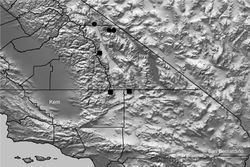Aptostichus sarlacc
| Notice: | This page is derived from the original publication listed below, whose author(s) should always be credited. Further contributors may edit and improve the content of this page and, consequently, need to be credited as well (see page history). Any assessment of factual correctness requires a careful review of the original article as well as of subsequent contributions.
If you are uncertain whether your planned contribution is correct or not, we suggest that you use the associated discussion page instead of editing the page directly. This page should be cited as follows (rationale):
Citation formats to copy and paste
BibTeX: @article{Bond2012ZooKeys252, RIS/ Endnote: TY - JOUR Wikipedia/ Citizendium: <ref name="Bond2012ZooKeys252">{{Citation See also the citation download page at the journal. |
Ordo: Araneae
Familia: Euctenizidae
Genus: Aptostichus
Name
Aptostichus sarlacc Bond, 2012 sp. n. – Wikispecies link – Sarlacc Trapdoor Spider’ ZooBank link – Pensoft Profile
Types
Male holotype (AP417) from California, San Bernardino County, 14.5km N, 16km E of Ridgecrest sand dunes, 35.7553, -117.50064, 960m, coll. D. Giuliani 15.ii.1981-12.iv.1981; male paratype (AP416) from California, Kern County, 11.3km, N 9.6km W of Inyokern, 35.7362, -117.98494, 2193m, coll. D. Giuliani 4.iv.1986; male paratype from California, Inyo County, Owens Valley, 9.6km S-SW of Independence, 36.7414, -118.26235, 1961m, coll. D. Giuliani 1.xi.1986-12.vi.1987. Deposited in CAS.
Etymology
The specific epithet is a noun in apposition taken from the fictional creature in George Lucas’ science fiction saga, Star Wars: Return of the Jedi.
Diagnosis
Males can be distinguished from other known closely related species of Aptostichus (e.g., Aptostichus cahuilla, Aptostichus aguacaliente) by having a long curved metatarsus IV relative to femur IV length and by having an abdomen devoid of any dorsal markings (Fig. 236). This species can be distinguished from geographical proximate members of the Simus species group, with similarly long fourth tarsi and by having a longer, more slender palpal tibia (Figs 241, 242). The distribution of Aptostichus sarlacc is distributed considerably further to the north of the aforementioned Hesperus species group taxa.
Description of male holotype
Specimen preparation and condition. Specimen collected dead from pitfall trap, preserved 70% EtOH. Coloration likely faded. Pedipalp, leg I left side removed, stored in vial with specimen. General coloration. Carapace, chelicerae, legs strong brown 7.5YR 4/6. Abdomen uniform very pale brown, lacking distinct dorsal markings (e.g., paratype coloration pattern, Fig. 236). Cephalothorax. Carapace 3.41 long, 2.95 wide, glabrous with only sparse thin black setae, stout black bristles along fringe; surface smooth, pars cephalica elevated. Fringe, posterior margin with black bristles. Foveal groove deep, moderately procurved. Eyes on low mound. AER slightly procurved, PER slightly recurved. PME, AME subequal diameter. Sternum moderately setose, STRl 1.90, STRw 1.62. Posterior sternal sigilla small, positioned towards lateral margin, anterior sigilla pairs small, oval, marginal. Chelicerae with distinct anterior tooth row comprising 5 teeth, posterior margin with patch of very small denticles. Palpal endites with patch of small cuspules on proximal, inner margin, labium with 3 small cuspules, LBw 0.60, LBl 0.29. Rastellum consists of 6 stout spines, 2 offset prolaterally. Abdomen. Setose, heavy black setae intermingled with fine black setae. Legs. Leg I: 3.60, 2.40, 2.14, 1.67, 1.12; leg IV: 3.44, 2.16. Light tarsal scopulae on tarsi legs I, II. Tarsus I with single, slightly staggered row of 13 trichobothria. Leg I spination pattern illustrated in Figures 239, 240; TSp 4, TSr 4, TSrd 3. Pedipalp. Articles slender, lacking distinct spines (Figs 241, 242). PTw 0.48, PTl 1.40, Bl 0.70. Embolus slender, curved at midpoint, with slight curve distally, lacking serrations (Figs 241, 242).
Variation (2). Cl 3.41-4.85, Cw 2.95-4.28, STRl 1.9-2.45, STRw 1.62-2.19, LBw 0.60-0.85, LBl 0.29-0.46, leg I: 3.60-5.00, 2.40-3.19, 2.14-2.97, 1.67-2.25, 1.12-1.53; leg IV: 3.44-4.75, 2.16-2.88; PTl 1.40-1.98, PTw 0.48-0.63, Bl 0.70-1.01, TSp 4-4, TSr 3-4, TSrd 3-3.
Description of female
Known only from male specimens.
Material examined
Known only from the type material.
Distribution and natural history
Little is known about this species; it is very rare in collections and is only known from two specimens collected in the Mojave Desert in Inyo, Kern and San Bernardino Counties (Map 29).
Conservation status
This species is rare in collections and is known from only two localities; its status is considered imperiled.
Species concept applied
Morphological.
Original Description
- Bond, J; 2012: Phylogenetic treatment and taxonomic revision of the trapdoor spider genus Aptostichus Simon (Araneae, Mygalomorphae, Euctenizidae) ZooKeys, 252: 1-209. doi
Images
|
![Figures 236–242. Aptostichus sarlacc sp. n.; scale bars = 1.0mm. 236–238 male paratype (AP416) from Kern Co. 236 habitus [806006] 237 retrolateral aspect, right leg I [806000] 238 prolateral aspect, right leg I [806004] 239–242 male holotype (AP417) 239 retrolateral aspect, leg I [805992] 240 prolateral aspect, leg I [805996] 241 retrolateral aspect, pedipalp [805998] 242 line drawings (in descending order) of holotype leg I metatarsus and tibia spination pattern (retro and prolateral views), pedipalp (retrolateral view), lower inset, line drawing of paratype TSrd spination pattern.](https://species-id.net/o/thumb.php?f=ZooKeys-252-001-g063.jpg&width=201)
